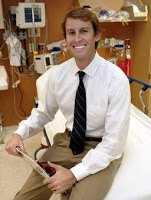Managed-care doctor creates process to steer pregnant Medicaid recipients who are using dangerous drugs into treatment

When Dr. Jeremy Corbett of Lexington found that “nearly one in five pregnant women enrolled in
the Medicaid managed-care program where he works were using narcotics or
other harmful drugs,” he tackled the problem. As medical director of the Kentucky Spirit Health Plan, “He designed a new program combining high-tech health information with case
management to tackle the problem of addicted babies, which is exploding
statewide,” reports Laura Ungar of The Courier-Journal. (C-J photo by Tim Webb)
Ungar describes how Corbett’s program works: “Employees examine patient records for pregnant Kentucky Spirit members. The
pharmacy department uses an analytics report, coupled with the Kentucky
All Schedule Prescription Electronic Reporting System, or KASPER, to
cross-check for drugs that could be dangerous during pregnancy,
including narcotics. Department employees also look at the pattern of
prescriptions, which could point toward doctor-shopping for pills. . . . Kentucky
Spirit sends letters to the prescribing doctor and the obstetrician the
woman is seeing, letting them know she is pregnant and has received a
prescription for dangerous drugs. Corbett said sometimes the prescribing
doctor doesn’t know the woman is pregnant, and the obstetrician doesn’t
know she’s taking narcotics. Corbett
said they also send letters outlining the dangers of taking certain
drugs during pregnancy, and case managers reach out to women at risk of
giving birth to addicted babies.”
The program started three weeks ago. Corbett said two women have asked to get substance-abuse treatment, for which Kentucky Spirit pays — “even residential treatment, which is
not required by Kentucky law — because it saves money in the long run,” Ungar reports. “Kentucky
has seen its hospitalizations for addicted newborns climb from 29 in
2000 to 730 last year — a 2,400 percent increase that far outpaces the
national increase.” Corbett told her, “When these babies wind up in the neonatal intensive care unit, it’s a
huge loss, emotionally, and it’s also a huge loss of state dollars.” (Read more)
